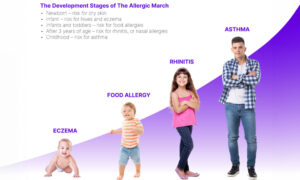
Can your allergies grow over time?
The allergic march, also known as atopic march or allergen march, is the phrase used to describe the natural progression of allergic responses in the body from infancy through adulthood. Your child’s eczema may be a warning sign for the development of future allergies. About half of children with eczema eventually develop asthma, and about a third develop food allergies. Eczema, which causes the skin barrier to crack, may allow both allergens and viruses in more easily. And wheezing from a viral infection could lead to asthma. The process of allergy development over years is often a predictable pattern with early signs.
In Southern states like Texas, allergies and asthma may progress and become severe due to continued exposure from diverse pollen-producing plant species and our year-round allergy seasons. Spring and summer are ideal for both indoor and outdoor allergens. Our gorgeous oak and pecan trees produce lightweight pollen that can travel miles. If you try to escape by staying inside, be aware that the hot and humid weather is the perfect place for mold and pet dander to fester. Things aren’t much better in the fall and winter, unfortunately. As the seasons change, fall foliage like ragweed, sagebrush, and goldenrod arrive when the weather cools. Winter pollen present from November to January from mountain cedar may cause a condition commonly known as “Cedar Fever.” And because we spend so much time inside when winter comes around, indoor allergens like dust mites, found in bedding, carpets, and upholstered furniture, can wreak havoc. Plus, turning the heat up can cause dry skin and nasal passages, making allergy symptoms even worse.
The development stages of the allergic march
The trajectory of the allergic march tends to follow an allergy development pattern that looks like this:
- Newborn – risk for dry skin
- Infant – risk for hives and eczema
- Infants and toddlers – risk for food allergies
- After 3 years of age – risk for rhinitis or nasal allergies
- Childhood – risk for asthma
Is the allergic march preventable?
Research is still underway to definitively answer this question, but there are steps you can take that studies say can make a difference:
- Introduce food allergens in small portions at any early age
- Use a moisturizer for infants to prevent the onset of eczema
- Encourage a healthy diet full of fruits, vegetables, fish, and vitamin D
- Take probiotics while pregnant
- Protect the immune system with exercise, enough sleep, and allergy-trigger avoidance
It’s most important to see an allergist to be properly diagnosed and to determine if immunotherapy, which stops the progression of allergic rhinitis into asthma, is recommended. Allergies are an inherited disorder and parents many times suspect that their child or loved ones may have them.
If you want to ensure that you or your child are not suffering the effects of the allergic march, schedule an appointment with one of our board-certified allergists or immunologists, who will help you build a treatment plan that’s right for you.
Please click here to schedule an appointment or call us at 713-697-4687 (713-MY-SINUS).



